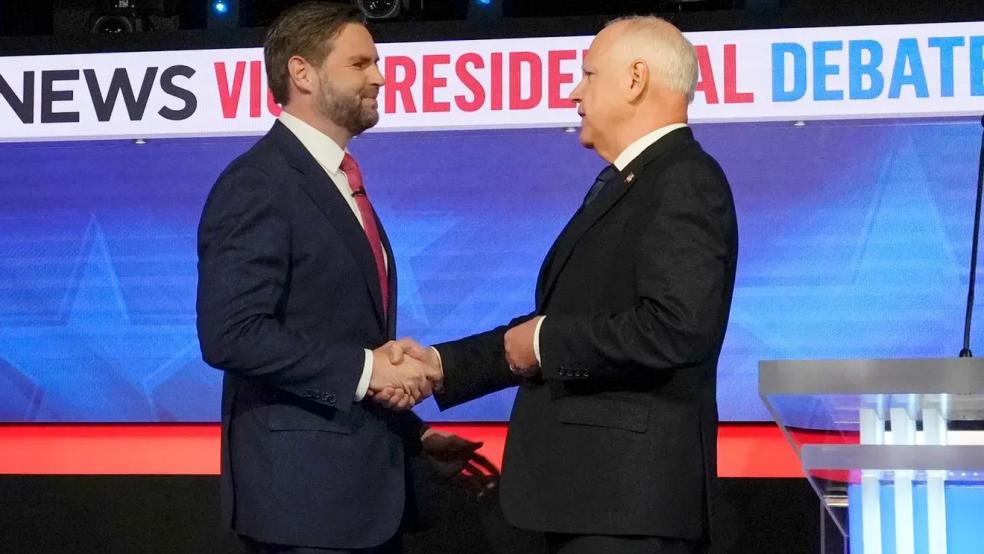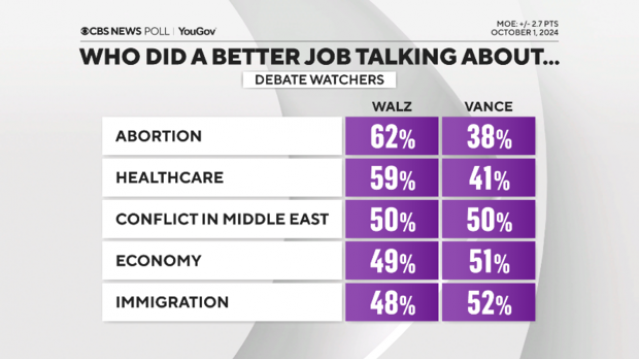Tuesday night’s vice-presidential debate elicited some words that have rarely been used to describe U.S. political discourse in recent years: civil, cordial, nice.
Sen. JD Vance and Gov. Tim Walz spent much of their time in a rather gentlemanly discussion of policy points that often glossed over significant differences and avoided bare-knuckle attacks on subjects that have come up frequently on the campaign trail. Both candidates also stumbled in response to questions they had to have known were coming. CBS’s “Late Show” host Stephen Colbert summed the evening up fairly well: “These two men were both a heartbeat away … from being interesting this evening,” Colbert joked. “Tonight was like having Thanksgiving with your most nervous uncle and your smuggest nephew.”
1. Vance won on style. The unpopular Republican running mate took advantage of his opportunity to burnish his public image. He delivered a polished, slick and mostly genial sales pitch for Trumpism while also landing critiques of Vice President Kamala Harris. For one night at least, he was more Yale Law than MAGA troll. Walz, by contrast, appeared less comfortable on stage and often struggled to clearly articulate his arguments, stumbling most notably when trying to explain why he had claimed, apparently falsely, to have been in Hong Kong during the 1989 Tiananmen Square protests in Beijing. “I’ve not been perfect, and I’m a knucklehead at times,” he said at one point. Walz also missed or passed up on some opportunities to fact-check Vance or score points in key exchanges.
2. But he ran into trouble on substance. Vance complained about being fact-checked when CBS’s moderators tried to clarify that Haitian migrants in Springfield, Ohio, are there legally. He also praised some of Harris’s agenda, saying, “Some of it, I'll be honest with you, it even sounds pretty good” before going on to question why Harris hadn’t already enacted her plans while vice president. And he made truly some audacious false claims, most notably that Trump had saved Obamacare and that the former president transferred power peacefully. Walz scored by asking Vance whether Trump had lost the 2020 election. Vance dodged the question. As smooth as he was for most of the debate, that video clip may be one of the lasting, viral moments from this debate. The Harris campaign has already turned it into an ad, running Vance’s answer alongside video from January 6, 2021.
3. The moderators asked about projected deficits. They noted that the Penn Wharton Budget Model has said that Harris’s economic agenda would add $1.2 trillion to deficits over a decade while Trump’s plans would add $5.8 trillion. They asked the candidates how they’d pay for their plans without ballooning deficits.
Walz meandered through some of Harris’s proposals before criticizing Trump’s tax cuts and tariff proposals. He offered this as an answer on paying for Democratic plans: “We'll just ask the wealthiest to pay their fair share. When you do that, our system works best. More people are participating in it, and folks have the things that they need.”
Vance responded by criticizing Harris and defending Trump’s economic record while criticizing the “experts” who advanced neoliberal economic policy over the last 40 years. “If Kamala Harris has such great plans for how to address middle class problems, then she ought to do them now, not when asking for a promotion,” he said, adding that economists who have warned about the effects of Trump’s proposals “have PhDs, but they don't have common sense and they don't have wisdom.” Vance did not specifically address the question of paying for Trump’s plans other than suggesting they’d unleash an economic boom.
4. Viewers were split. A CBS News poll found that 42% of debate watchers said Vance won, 41% thought Walz did, and 17% called the debate a tie. Nearly three-quarters of those polled, 74%, said Walz sounded reasonable, slightly more than the 65% who said the same of Vance. Both candidates saw their favorability ratings rise.
5. None of it may matter much. With the fallout from Hurricane Helene, Iran’s attack against Israel and a dockworkers’ strike all making headlines, the debate may fade from national attention quickly.






